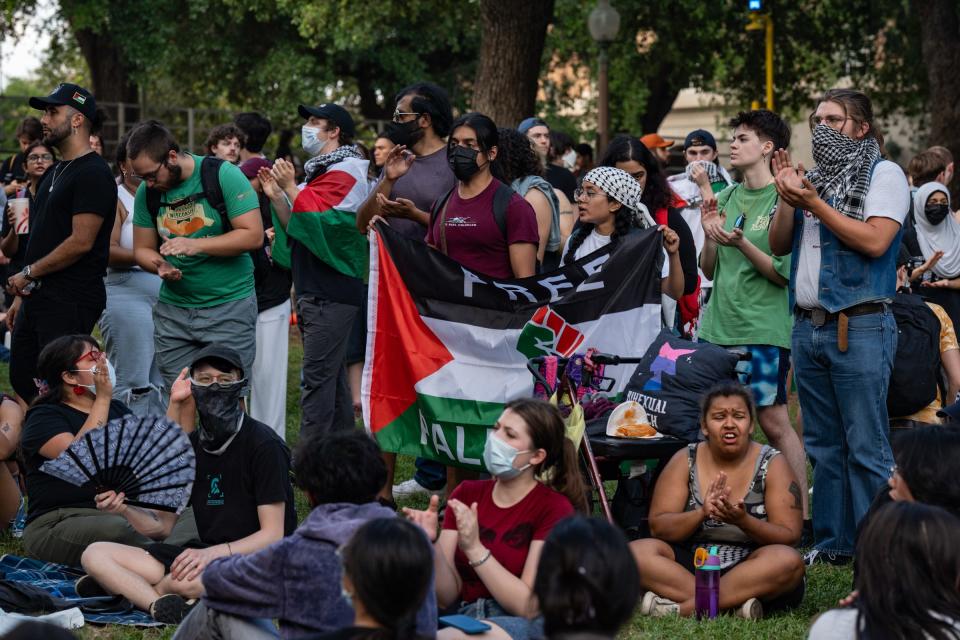'Our university will not be occupied': UT president says pro-Palestinian protest was prohibited
- Oops!Something went wrong.Please try again later.
University of Texas President Jay Hartzell emailed the campus community Wednesday night after around 50 people were arrested earlier in the day during a peaceful pro-Palestinian protest at the University of Texas organized by the Palestine Solidarity Committee, a registered student organization at UT and chapter of national Students for Justice in Palestine.
"Today, our University held firm, enforcing our rules while protecting the Constitutional right to free speech," Hartzell said. "Peaceful protests within our rules are acceptable. Breaking our rules and policies and disrupting others’ ability to learn are not allowed. The group that led this protest stated it was going to violate Institutional Rules. Our rules matter, and they will be enforced."
Hartzell said Wednesday was a "challenging day" with "a lot of emotion surrounding these events." He didn't, however, confirm how many people were arrested on campus, as the Yale University president did when similar arrests were made on that campus.
The American-Statesman witnessed at least 30 people getting arrested, and the Texas Department of Public Safety updated its arrest count Wednesday night to 34. George Lobb, an attorney with the Austin Lawyers Guild, said about 54 people were being held at the Travis County Jail in relation to the protest. Travis County sheriff's office spokesperson Kristen Dark confirmed 20 had been booked in jail shortly after 8 p.m.
Live updates: UT-Austin students hold pro-Palestinian protest; at least 50 arrested

Protesters, in a post on Instagram, said they intended to occupy the lawn in front of the UT Tower in solidarity with protesters at Columbia University and other campuses across that nation to demand their universities stop investing in Israeli weapons.
The protest at UT was met with an immediate, large police force on horseback, bikes and foot sent by both UT and Gov. Greg Abbott, according to DPS.
Police let the protesters march, guiding them in the opposite direction of the UT Tower, for about 45 minutes before ordering them to disband at 12:30 p.m. When protestors regathered at the Speedway Mall, chanting "Free Palestine," despite some organizers repeating officers' call to disperse to avoid being arrested, police began making the first arrests.
"Our University will not be occupied," Hartzell wrote in his Wednesday night email.
Austin police, DPS troopers and UT police were present at the protest. Several protesters, including students and at least one journalist, were injured when police pushed the crowds back.
More: What is a pro-Palestine protest? Here's why U.S. college students are protesting
Hartzell said the university was prepared for this event and did what it had to do to keep the campus safe. He said "many ignored University officials’ continual pleas for restraint and to immediately disperse" and non-UT affiliated people were also present.
"The University did as we said we would do in the face of prohibited actions," Hartzell wrote.
He thanked UT staff and law enforcement officials "as well as support personnel who exercised extraordinary restraint in the face of a difficult situation that is playing out at universities across the country."
"There is a way to exercise freedom of speech and civil discourse, and our Office of the Dean of Students has continued to offer ways to ensure protests can happen within the rules," Hartzell wrote. "The University of Texas will continue to take necessary steps so that all our University functions proceed without interruption."
More: FOX 7 Austin photographer among dozens arrested at pro-Palestinian protest at UT campus
This article originally appeared on Austin American-Statesman: Pro-Palestinian protest at UT-Austin was prohibited, president says

